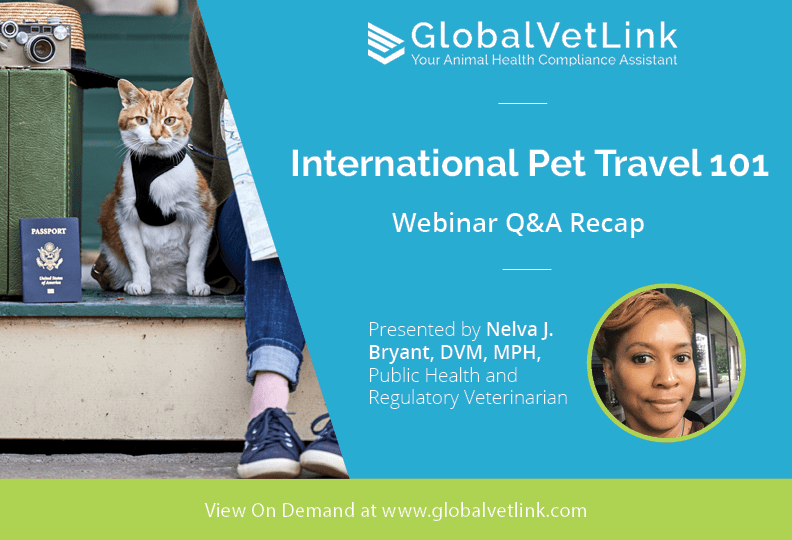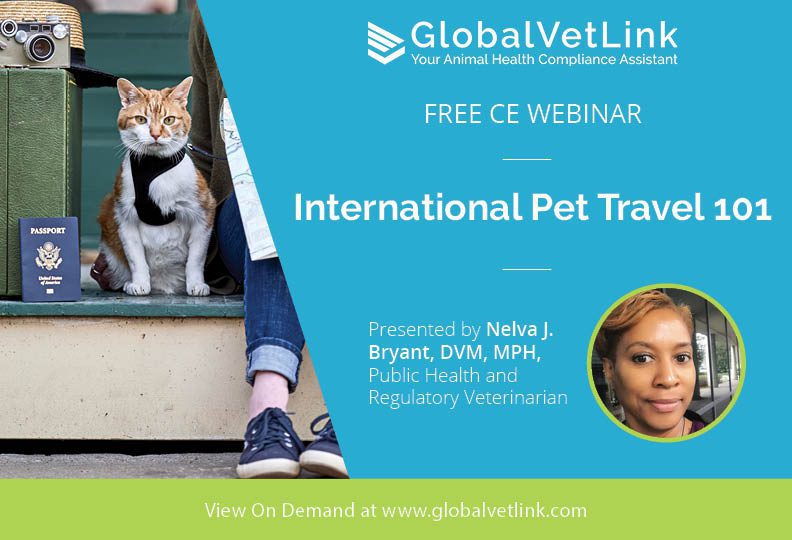It is important to check with the country of destination, and any other countries the pet would be traveling through, to ensure all requirements are met.
It is important to comply with all USDA and CDC guidelines when returning to the United States from a foreign country. Please visit the USDA Pet Travel site for the most up-to-date import requirements.
Canada – Depending on the age of the pet, a health certificate (CVI) may be required. It is always recommended to travel with a CVI and rabies vaccination certificate.
Mexico – Effective 12/16/2019 a health ceritifcate is no longer required to enter Mexico. Pets may be taken to the border where they will be inspected before entry. It is always recommended to travel with a CVI and rabies vaccination certificate.
Based on industry research, we suggest charging $250 – $500 for an International Health Certificate. Veterinary practices in more urban and affluent areas may charge $750 – $1,500 per International Health Certificate.
The USDA Pet Travel site and GlobalVetLink Pet TravelPass will provide up-to-date pet travel requirements. You can also contact the embassy of the destination country.
We are not aware of any requirements that would prevent you from preparing and signing documentation for your own pets to travel internationally.
Most international destinations will require certificates to be endorsed. The USDA Pet Travel site and GlobalVetLink Pet TravelPass will provide up-to-date pet travel requirements based on the destination.
Yes, there are fees for certificate endorsement. Those fees can be paid by check when mailing certificates, or online when submitting through VEHCS.
The shipping label will need to be provided to VEHCS when the certificate is submitted for endorsement.
If documents are being submitted to USDA-APHIS via mail, a return mailing label is required to be sent with the documents. Whether you or the pet owner send the certificates, the shipper will need to include a return mailing label.
If there are any specific requirements for dewormers or other treatments, the USDA Pet Travel site and GlobalVetLink Pet TravelPass will reflect the requirements of the selected country. If you have questions regarding a specific product, it is recommended to contact the destination country to verify approval of the product you will be using.
Countries require that the microchip is implanted prior to the rabies vaccination to ensure that the pet identified on the health certificate matches the pet who received the rabies vaccination.
The rabies vaccination certificate should include the owner and pet information, rabies tag number, and vaccination information including manufacturer, product, exposure (initial or booster), lot/serial number, administered date, vaccine duration and vaccination expiration date.
Microchip numbers that are less than 15 digits long indicate that the microchip is not ISO compliant.
ISO compliant microchips are recommended for international pet travel. If the pet’s microchip is not ISO compliant, they should travel with a microchip reader, as the destination may not have a reader available to verify a non-ISO compliant microchip.
It is a good practice to verify the microchip number and location when you first see a new patient, and use that verification date as the implant date when it is required.
These will vary by airline carrier and time of year. For specific temperature ranges for the acclimation certificates, visit the airlines cargo website prior to completing the CVI.
Some airlines may have an additional forms for the pet owner to complete, however this varies by airline. It is recommended to have the animal owner consult the airlines website for all document requirements.
Correct! Through GlobalVetLink, you can create the required documentation for international travel and then submit to USDA APHIS for endorsement, either online through VECHS or by mail.
GlobalVetLink has built a Compliance Engine that powers the platform. Our Compliance Engine checks the USDA Pet Travel site and other international pet travel resources to ensure that we have the most current requirements powering the International Pet TravelPass.
The GlobalVetLink platform has the correct health certificates, provided by the USDA, embedded in the product. These certificates have the correct sections crossed out as required by the destination country.
Yes, you can start and save a draft without entering a travel date. A draft can be created with only the destination location and the owners information. You will be required to enter the travel date before you can finalize the certificates.
Yes, you can create and save multiple drafts within the GlobalVetLink platform.
You will be charged for the certificate at signing.
At this time, you can only enter on microchip when creating a Pet TravelPass.
Currently, you would need to create two separate Pet TravelPasses, one for Ireland and one for Germany, with the Ireland address in the destination and via Germany. Our team will be working to streamline this into one process.
The GlobalVetLink Customer Success team is available seven days a week to assist customers with any questions you may have. When you are logged into GlobalVetLink creating a certificate, you can chat with our team for answers to your questions.
The GVL Pet TravelPass will provide you a list that provides the requirements (documents needed, health requirements, travel timeline and any additional notes) for any country. You can use this list as reference for the countries that we do not have the International Health Certificate process fully developed, and you can also use GlobalVetLink to create the Certificate of Veterinary Inspection and Rabies Vaccination Certificate.
Your user profile is tied to a specific hospital location, as it pulls in the hospital information to apply to the certificates. You can contact our team to have your profile transferred to another hospital location, or set up a separate profile for the second hospital location.
After you have entered all of the information into the Pet TravelPass, you will be able to review the certificates. Once you have reviewed them, the final step is sign the documents in GlobalVetLink to complete them. There are 2 options for signing: Electronic Signature (if the destination country allows) and wet ink signature. You will be able to select your preference before signing. You will click the ‘Sign’ option and enter your username and password to sign the certificates. If you selected Electronic Signature, your electronic signature will be applied to the documents and you can download them. If you selected wet ink signature, your documents will be left blank in the signature section. You will then need to download and print the documents, then add your signature in BLUE ink. Once signed, you can submit to the USDA for endorsement.
The GlobalVetLink monthly subscription is $34.95 and an International Pet TravelPass is $92.00. GlobalVetLink charges the veterinary practice for the subscription fee and certificates created.
Yes, you can sign up for a pay as you go plan. International Pet TravelPasses are $115 on the pay as you go plan.
On GlobalVetLink’s subscription plan, an International Pet TravelPass is $92 per pet.
Through the GlobalVetLink platform, you can create:
International Health Certificates
Domestic Health Certificates (Including Hawaii)
Rabies Vaccination Certificates
Equine Infectious Anemia Tests
Extended Equine CVIs
Veterinary Feed Directives
Veterinary Prescriptions
ForSale Certificates (Florida Only)

